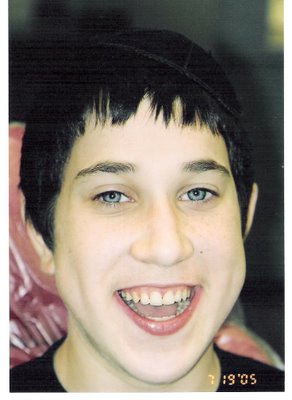TNR: "Mourning in America"
My May 1 copy of The New Republic arrived today, in which I found this book review,
"THE CONTEMPORARY EXPERIENCE OF GRIEF: Mourning in America," by Rochelle Gurstein, a review of The Year of Magical Thinking, by Joan Didion (Alfred A. Knopf, 227 pp., $23.95); and, The Best Day the Worst Day: Life with Jane Kenyon, by Donald Hall (Houghton Mifflin, 258 pp., $23).
I haven't fully digested Ms. Gurstein's article yet, but I was struck by these excerpts about a book by C.S. Lewis:
"THE CONTEMPORARY EXPERIENCE OF GRIEF: Mourning in America," by Rochelle Gurstein, a review of The Year of Magical Thinking, by Joan Didion (Alfred A. Knopf, 227 pp., $23.95); and, The Best Day the Worst Day: Life with Jane Kenyon, by Donald Hall (Houghton Mifflin, 258 pp., $23).
I haven't fully digested Ms. Gurstein's article yet, but I was struck by these excerpts about a book by C.S. Lewis:
A Grief Observed was published in 1961, and it has been in print ever since. As one might expect from such a rigorous intellect, Lewis's account of his pain is a sobering one. "Don't come talking to me about the consolations of religion," Lewis declares, "or I shall suspect that you don't understand." His wife's death so completely unhinges him that when he tries to pray for her, he finds, to his "bewilderment and amazement," that he must halt, for he feels "a ghastly sense of unreality, of speaking into a vacuum about a nonentity." That he cannot locate her in either time or space raises the crushing possibility that his faith was strong only so long as it was not tested: "Only a real risk tests the reality of a belief. Apparently the faith--I thought it faith--which enables me to pray for the other dead has seemed strong only because I have never really cared, not desperately, whether they existed or not. Yet I thought I did."I'll have to read Lewis's book before I can comment. Please email me if you have difficulty accessing the article.
.....
The rest of his beautiful little volume provides an unflinching record of Lewis's effort to reconcile himself with his loss. It is, above all, an exemplary story of the experience of personal suffering, and the humbling of the will that comes with it. The story moves toward a close with Lewis struggling to put into words a sublime yet terrible paradox: "Lord ... can I meet H. again only if I learn to love you so much that I don't care whether I meet her or not?" Lewis's capacity to formulate this paradox signals a renewal of his faith. And while it gives him the hope of redemption and a future reunion with his wife, it also makes clear why religion does not offer any consolations, for Lewis must accept precisely what he found most unbearable when he was in the throes of grief: that he will never again meet the particular woman he loved with all his being. Indeed, their eternal reunion is possible only if he gives up all such earthly illusions.






0 Comments:
Post a Comment
<< Home